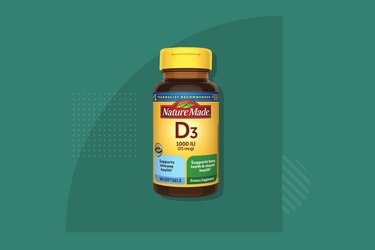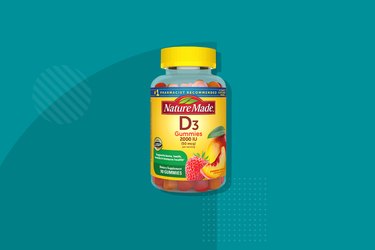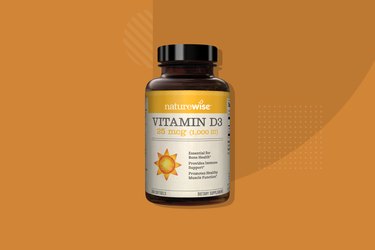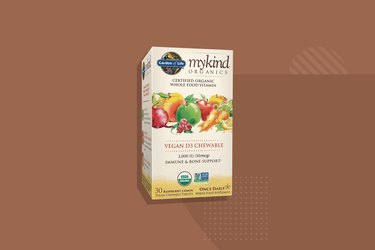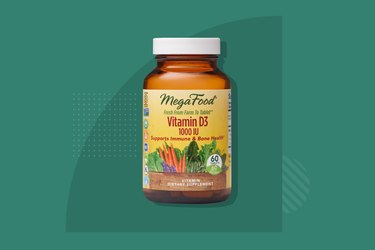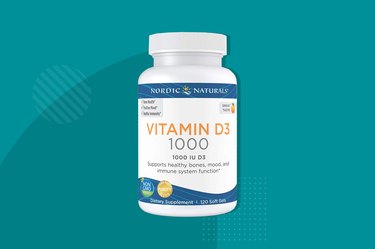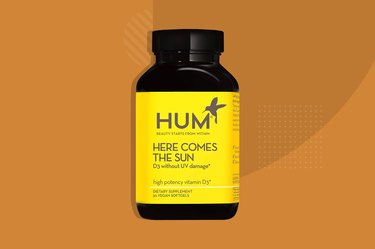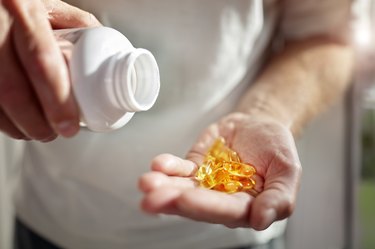
Vitamin D is getting its day in the sun, and it is well deserved. Known, quite literally, as the sunshine vitamin, this mighty nutrient plays a key role in the health of our bones, nerves, immune systems and more.
While you can get the vitamin from certain food sources, the sun is the main supplier, which can make it challenging to get enough depending on the seasons where you live. That's where supplements can come in handy.
Video of the Day
Video of the Day
Check out our recommendations, then read on to learn what to know before you take one, including how to choose the best vitamin D supplements for your health goals.
Best Vitamin D Supplements
- Best Overall: Nature Made Vitamin D3 ($11.90, Amazon)
- Best Gummy: Nature Made D3 Adult Gummies ($16.15, Amazon)
- Best on a Budget: Naturewise Vitamin D3 ($13.99, Naturewise)
- Best Organic: Garden of Life Mykind Organics Vegan D3 Chewable ($12.99, Amazon)
- Best Vegetarian: MegaFood Vitamin D3 ($20.99, MegaFood)
- Best Softgel: Nordic Naturals Vitamin D3 ($14.41, Amazon)
Warning
Talk to your doctor before adding a vitamin D supplement to your diet. Your doctor can order a blood test which will help them advise you on exactly how much vitamin D you need to take based on your current levels.
The Best Vitamin D Supplements
If you are unsure of which vitamin D supplement to take, getting a recommendation from your doctor is always a good idea. Here are some other good choices:
1. Best Overall: Nature Made Vitamin D3
Pros:
- easy to swallow
- gluten-free
- no artificial colors or flavors
Cons:
- not suitable for those with soy allergies
Nature Made Vitamin D3 is going to be your best bet for both price and quality. This liquid softgel is easy to swallow, gluten-free and does not have any artificial colors or flavors added.
Nature Made D3 supplements are USP-tested for ingredients, potency and manufacturing processes. The 1,000-IU-dose is appropriate for anyone wanting to supplement with vitamin D daily.
This supplement does contain soy, though, so if you have an allergy, it's best to try another brand.
2. Best Gummy: Nature Made D3 Adult Gummies
Pros:
- USP-verified
- tasty, gummy form
- no synthetic colors, flavors or artificial sweeteners
- only 2 grams added sugars
- no high-fructose corn syrup
Cons:
- contains gelatin: no suitable for vegans or vegetarians
Nature Made also gets the award for the best vitamin D gummies. These gluten-free gummies have only 2 grams of added sugars and don't come with any artificial flavors, colors or sweeteners.
While it can be challenging to find a gummy supplement that meets quality standards, this one is a rare standout that actually meets the mark.
Gummy vitamins often fail quality checks for having too much or too little of a nutrient because of how they're manufactured, according to Consumer Lab. But Nature Made gummies are USP-verified to ensure they actually have the amount of the nutrient on the label.
3. Best on a Budget: Naturewise Vitamin D3
Pros:
- inexpensive
- third-party tested
- gluten-free
- soy-free
- dairy-Free
- non-GMO
Cons:
- gelatin capsule means it is not suitable for vegans or vegetarians
Naturewise Vitamin D3 wins for best on a budget — you get an entire year's supply of vitamin D for less than $15.
This supplement company adheres to third-party testing and CGMPs. This supplement is a good daily dose (1,000 IU) and is also gluten-free, dairy-free and non-GMO.
The company uses olive oil in its supplement instead of soy, so this is also a good choice if allergies are an issue.
Buy it: Naturewise ($13.99 for 360 softgels); Amazon ($13.29 for 360 softgels)
4. Best Organic: Garden of Life Mykind Organics Vegan D3 Chewable
Pros:
- vegan
- organic
- gluten-free
- non GMO
- kosher
Cons:
- Contains added sugars (dextrose)
Garden of Life has a reputation for being a reliable organic, vegan and sustainable supplement brand. They are NSF-certified for being gluten-free, non-GMO project verified and kosher.
The vitamin D in this supplement comes from lichen and includes a food blend of flax, carrot, broccoli, cauliflower and spinach, as well as an organic mushroom blend.
Each chewable tablet contains 2,000 IU of D3 and one bottle will last you 30 days.
5. Best Vegetarian: MegaFood Vitamin D3
Pros:
- vegetarian
- kosher
- soy-free
- NSF-verified
- gluten-free
- non-GMO
Cons:
- pricey
MegaFood Vitamin D3 is a good choice for those following a vegetarian diet.
Since many sources of D3 come from animals, it can be difficult to find one sourced from plants. These supplements are vegetarian, kosher, soy-free, NSF-verified, gluten-free and non-GMO project verified.
They are a pricey option, though, at close to $20 for a two-month supply.
Buy it: Amazon ($20.99) MegaFood.com ($20.99)
6. Best Softgel: Nordic Naturals Vitamin D3
Pros:
- convenient and easy to swallow
- no artificial colors or flavors
- third-party tested
- non-GMO
- gluten-free
- dairy-free
Cons:
- not suitable for vegans or vegetarians
Buyers love these mini vitamin D softgels because they're mildly flavored and easy to swallow. Made with D3 from lanolin and olive oil, this orange-flavored vitamin D supplement has no artificial colors or flavors added.
Nordic Naturals' products go through third-party testing that adhere to strict international standards for quality and freshness. This product is also non-GMO, gluten-free and dairy-free.
This one is not a vegan option, as the capsule is made from gelatin and the D3 is sourced from lanolin (sheep's wool).
7. Best Vegan: Hum Nutrition Here Comes the Sun
Pros:
- vegan-friendly
- made in the USA
- dairy-free
- wheat-free
- soy-free
Cons:
- not a chewable option
This product from HUM Nutrition is made from lichen (D3 from algae) and has a softgel capsule made from tapioca, glycerin and water, making it a great vegan option.
Free of many allergens, it contains no wheat, dairy or soy and has no artificial colors, flavors or preservatives.
Buy it: HUM Nutrition ($12); Amazon ($16)
What Is Vitamin D?
Vitamin D is both a hormone and a vitamin. It's considered a fat-soluble vitamin because it dissolves in fat (aka it needs fat to be absorbed) and is stored in your body fat, according to the National Institutes of Health (NIH). Unlike water-soluble vitamins, which are easily excreted, fat-soluble vitamins like D can build up in the body, so it's possible to get too much.
There are two forms of vitamin D — D2 and D3. Both are beneficial in raising vitamin D levels in your body, and there is inconclusive evidence to support the use of one over the other.
At low doses (1,000 IU), both forms of vitamin D appear to be effective, but in high doses, D3 may be slightly more beneficial, per the NIH.
Food Sources of Vitamin D
There are very few natural food sources of vitamin D. Some of them include:
- Salmon, tuna, trout, sardines
- Egg yolks
- Fortified foods: Milk, orange juice, breakfast cereals
Mushrooms grown in UV light may also have vitamin D (look for a note about that on the mushrooms' packaging).
Do I Need a Supplement?
You only need about five minutes outside with your arms and legs exposed, twice a week, to get enough vitamin D, per the NIH. But that sun exposure is a double-edged sword: Too much can up your risk for developing skin cancer, according to the American Cancer Society.
If it's challenging to get enough sun and fit vitamin-D-rich-foods in your diet, taking a supplement is an alternative option. You should confirm your need for a vitamin with your doctor.
Some people are more prone to vitamin D deficiency. According to the NIH, factors that put you at a higher risk include:
- Advancing Age – As you age, your skin's ability to produce vitamin D declines. Those over 65 only produce one-fourth as much vitamin D as adults in their 20's.
- Darker Skin Color – Skin with more melanin (darker tones) typically retains less vitamin D.
- Little Exposure to Sunlight – Not having access or the ability to get those rays of sun, reduce one's potential for obtaining sufficient vitamin D.
- Obesity – Because vitamin D is stored in fat, obese individuals have less Vitamin D circulating in the blood – limiting the availability for the body to use it.
- Malabsorption Issues — Inflammatory bowel disease, cystic fibrosis and liver disease are among those diseases that make it difficult for the body to absorb vitamin D.
Symptoms of deficiency include:
- Fatigue
- Muscle weakness
- Joint pain
- Mood changes
If you're concerned that you may be deficient because of any of these risk factors, talk to your doctor who can confirm by administering a blood test.
How Much Vitamin D Do You Actually Need?
Anyone over the age of 1 needs 600 IU of vitamin D every day, and adults over 70 need 800 IU per day, according to the NIH.
Keep in mind that more is not always better when it comes to any nutrient. While it's not likely you'll get too much vitamin D from the sun, you can get too much from a supplement, which can lead to side effects like vitamin D toxicity, per the Mayo Clinic.
Vitamin D toxicity can cause calcium to build up in your bloodstream, which can lead to side effects such as:
- nausea
- vomiting
- weakness
- frequent urination
Vitamin D toxicity might progress to bone pain and kidney problems, such as kidney stones. Reach out to your doctor right away if you think you have vitamin D toxicity.
To avoid this problem, keep your daily dose below 4,000 IU, per the NIH. Go for supplements that offer 1,000 or 2,000 IU unless otherwise directed.
Potential Interactions
High doses of vitamin D and blood pressure medications such as Diltiazem, Verapamil and Thiazide diuretics can increase your risk of hypercalcemia and reduce the effectiveness of the drug, according to the Mayo Clinic.
Also, be cautious about supplementing vitamin D when on the heart medication Digoxin, as it may also raise your blood calcium to higher-than-normal levels, increasing your risk of heart attack.
If you're taking any medications, talk to your doctor before taking vitamin D supplements to avoid harmful interactions.
What to Look for in a Vitamin D Supplement
You have a lot of choices when it comes to vitamin D supplements. Here's a list of what to look for to get you started.
Quality
Basically, you always want to check if your supplement is what it says it is and does what it's supposed to do by looking for things like third-party testing and certification.
Dietary supplements aren't tightly regulated by the Food and Drug Administration (FDA), though it does set Current Good Manufacturing Practices (CGMPs) for companies to follow. Brands also often seek a third-party verification from trusted organizations like Consumer Lab, U.S. Pharmacopeia or NSF International.
If a supplement brand uses CGMPs and/or has been third-party tested, it will often be listed on the product label or brand website.
Strength
Dosages on supplements can range pretty widely. As mentioned, the one with the most isn't always better. Opt for vitamin D supplements with 1,000 IU or 2,000 IU, and remember it's best to stick below the recommended 4,000 IU unless your doctor says you need it (in which case, you will likely be given a prescription).
Delivery Method
Vitamin D supplements are available in tablets, softgels, drops and gummies or chews, and you have the choice to take your vitamin D in any form that works best for you. If you have difficulty swallowing pills, chewables or gummies may be better options, for example.
Ingredients
Vitamin D3 can be obtained from several sources. If you eat a vegan diet, you'll want to look for one sourced from algae oil (lichen) versus fish oil or lanolin (from sheep's wool). Additionally, check for added sugars and other additives such as artificial colors or flavors on your product labels.
- National Center for Biotechnology Information: "Overview of Vitamin D"
- National Institutes of Health: "Vitamin D"
- Nutrients: "Evidence that Vitamin D Supplementation Could Reduce Risk of Influenza and COVID-19 Infections and Deaths"
- Consumer Lab: "Gummy Vitamin Concerns"
- Harvard T.H. Chan School of Public Health: "Vitamin D"
- American Cancer Society: "Ultraviolet (UV) Radiation"
- Mayo Clinic: What is vitamin D toxicity? Should I be worried about taking supplements?
- Mount Sinai Health System: 25-hydroxy vitamin D test
- Portland Clinc: Can You Over-do Vitamin D?
- Green Queen: We Are Supplementing with Vitamin D3 More than Ever.
